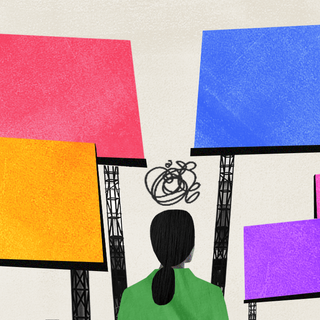
How Being More Self‑Compassionate Can Help Us Feel Less Bored
“[S]elf-compassion is associated with increased perceptions of meaning in life and consequently less boredom.”

Boredom is a universal, ubiquitous human emotion that is lamented quite often but has relatively evaded scientific deep-dives. The pandemic normalized a state of chronic boredom, though — as we collectively witnessed the inextricable link between fatigue, depression, anxiety, and other emotions that accompany the doldrums. New research, however, attempts to look at this delicate subject, and even suggest an antidote to this state of being.
Published in Personality and Individual Differences, the study points towards “self-compassion,” the idea of being kinder to oneself, as a way to address boredom. The researchers conducted three studies — with 49, 265, and 191 participants respectively — before arriving at this conclusion.
To understand the link between self-compassion and boredom, it’s important to grasp what boredom really means. John Eastwood, a clinical psychologist at York University in Toronto, describes the state of being bored as having an “unengaged mind” — one that is longing for stimulation or connection, but can’t find any. “In a nutshell, it boiled down to boredom being the unfulfilled desire for satisfying activity,” notes Eastwood.
That’s where self-compassion comes in. According to Very Well Mind, practicing it “increase[s] perceptions of a meaningful life by strengthening our self-worth and enhancing feelings of connection –to both the self and others.” Past research also associates self-compassion with increased life satisfaction and greater social connectedness, among other benefits.
Related on The Swaddle:
Why Some People Get Bored More Than Others
“Chronic boredom, often referred to as ‘boredom proneness,’ is linked to many negative outcomes for the individual and society at large… [But] it appears that individuals who have high levels of self-compassion are less prone to boredom.,” Muireann O’Dea, the first author of the present study and Ph.D. researcher in psychology at the University of Limerick, said in a statement, adding that “in particular, self-compassion is associated with increased perceptions of meaning in life and consequently less boredom.”
In general, ADHD people, and those who struggle with sustained attention, are often prone to boredom — as are individuals who have unconsciously sought the aid of ennui as a defense against emotional pain. But in the digital age, we’re living in, the number of people predisposed to boredom has widened; we have become more and more used to being constantly bombarded by stimuli that accustom us to constant stimulation but don’t hold our interest for long.
“Chronic boredom,” then, is not as innocuous as it sounds. It is linked to higher risks of “depression, anxiety, drug addiction, alcoholism, compulsive gambling, eating disorders, hostility, anger, poor social skills, bad grades, and low work performance,” according to Scientific American.
As these issues come to fore, scientists are beginning to delve into the subject.
Related on The Swaddle:
Why is Lockdown Boredom Pushing People to Smoke, Drink and Snack More?
Like a 2012 study that explored the use of nostalgia as an antidote to boredom, the present research, too, targeted the feeling of meaninglessness and listlessness that accompany boredom.
Further, the more connected we feel to ourselves, the less painful it might become to spend time with ourselves — arguably, an activity that is further complicated by feelings ofself-hatred and low self-esteem, both of which may be addressed, at least to some extent, by practicing self-compassion. “Drug use takes place during downtime when the person would have otherwise been entertaining themselves,” McWelling Todman at the New School for Social Research in New York City, had said, commenting on the not-so-healthy coping mechanisms a bored person may resort to.
Research also suggests that when people recovering from addiction find ways to keep boredom at bay, they can significantly lower the risk of relapse. And, of course, chronic boredom can propel people down mental health spirals.
“When people are bored, they’re disengaged from the satisfying activity and more likely to become internally focused in a negative, ruminative cycle,” Eastwood says.
Devrupa Rakshit is an Associate Editor at The Swaddle. She is a lawyer by education, a poet by accident, a painter by shaukh, and autistic by birth. You can find her on Instagram @devruparakshit.
Related


Overrated, Not: One‑Hit Wonders
